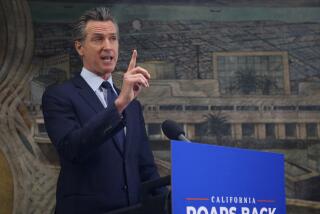California Taxpayers Still Not Getting Money’s Worth
WASHINGTON — For the 12th consecutive year, Californians sent more in tax dollars to the federal government in 1998 than they got back in services, and the year’s imbalance set the record for any single state, according to a study.
Last year, California paid $19.4 billion more to Washington than it got back in services, shattering the record of $14.3 billion set by the Golden State in 1997, the Tax Foundation, a nonpartisan research group, reported.
“Federal spending in California has remained flat,” said Tim Ransdell, executive director of the California Institute for Federal Policy Research, a Washington-based think tank. “In fact, it has declined in real dollar terms. California is behind the curve when it comes to partaking in federal spending.”
Overall, Californians paid $212 billion in taxes last year. The foundation determined the imbalance figure by calculating federal spending attributable to each state (excluding costs such as overseas defense operations and interest on the national debt).
The foundation reported that California was home to 12.3% of the nation’s residents in 1998 and paid 12.5% of federal taxes, but received back just 11.2% of federal payments and expenditures.
Put another way, the statistics mean that Californians get about 89 cents worth of federal services on every dollar sent to Washington.
Based on this return, California ranked 39th among the 50 states. The foundation reported that New Mexico ranked first, getting $1.94 in return for every dollar paid to Washington, while New Jersey ranked last, receiving just 68 cents for every federal tax dollar paid by its residents.
The Golden State’s imbalance is linked in part to its rebounding economy. Individual incomes are higher than they were during the last five-year recession--and when workers earn more, they pay more in federal income tax.
“It’s good news that California’s economy has bounced back, but the rising incomes have revived the long-standing, traditional funding imbalance the state faces year after year,” Ransdell said.
Even in the depths of the recession, California remained a donor state. That is partly because the median income for Californians remained higher than for residents in most other states, so the dollars to Washington kept flowing.
Also, the state’s population tends to be relatively young--California’s share of residents over 65 is among the lowest in the nation--meaning Washington sends fewer Medicare and Social Security dollars its way. (According to the Census Bureau, 11.1% of California’s population is over 65, compared to the nationwide figure of 12.7%.)
California’s return on its federal taxes once had been in the black, thanks largely to a robust defense industry that sent federal dollars gushing into the state. From 1981 to 1986, federal spending in California exceeded taxes paid by $26.9 billion, according to the foundation’s figures.
But California slipped into the red as defense spending dwindled. By 1990, California’s losses in the balance of tax payments had more than made up for the surpluses that marked the first part of the decade.
By 1998, the tally for the 12 years of imbalance was nearly $123 billion.
More to Read
Get the L.A. Times Politics newsletter
Deeply reported insights into legislation, politics and policy from Sacramento, Washington and beyond. In your inbox three times per week.
You may occasionally receive promotional content from the Los Angeles Times.










